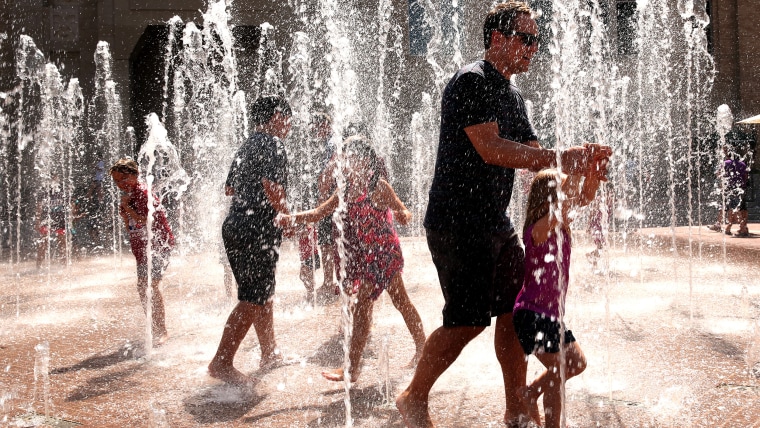According to the National Weather Service, excessive heat watches and heat advisories are in effect for much of the Midwest, Great Plains and Mississippi River Valley regions. And if weather forecasts are correct, the heat wave will move to the Northeast and Mid-Atlantic states this weekend.
These dangerously hot temperatures are hard to deal with, but here are some tips to keep you cool and safe:
1. Never leave anyone in a locked car.
Hot cars can kill children or pets very quickly.
"Far too many wonderful parents and caregivers believe that this would never happen to them or their family," Janette Fennell, KidsAndCars.org president and founder, said in a statement earlier this year. "Nobody is immune."
RELATED: Hot car danger: Jeff Rossen shows how to rescue a child
Never leave anyone in a closed vehicle. Get more facts about hot car deaths here.
2. Take breaks from the heat.
Avoid being outside for too long and don't exercise during the hottest time of day. Children, the elderly and those with respiratory illnesses or other medical conditions are particularly vulnerable during heat waves, so postpone outdoor activities, if possible.
3. Check in on each other (and your pets).
Make sure neighbors, particularly senior citizens, are safe and in air-conditioned areas. Go to local cooling centers if air conditioning is not available. When temperatures reach the high 90s, air conditioning is crucial — fans will not prevent heat-related illnesses once the mercury is that high, the CDC says.
Pets need to stay safe, too: Make sure they have fresh water to drink, limit their exercise, and beware of asphalt or other hot surfaces, which could be uncomfortable for them to walk on.
3. Wear light-colored clothing.
Light-colored and lightweight clothing will absorb less heat from the sun.
RELATED: Are you dehydrated? 9 symptoms to look out for
4. Eat and drink mindfully.
Don't wait until you feel thirsty to drink water or other fluids. Avoid alcohol and caffeine and very sugary drinks, which can dehydrate you. Eat smaller meals: The higher your metabolic heat, the more water loss your body may experience. Fruits and vegetables are water-packed foods which will help hydrate you as you eat them.
5. Keep cool.
A cool bath or shower can cool you down quickly. Indoor activities, like walking inside an air-conditioned mall or going to a movie theater or public library, are good options to avoid getting overheated. If you do go outside, apply SPF sunscreen and wear a hat to keep the sun out of your face. Keep shades down. If your air conditioner is broken and you absolutely cannot get to an air-conditioned area, reflect the sun from your windows with aluminum foil over cardboard in your windows.

6. Look out for signs of heat illness.
Heat cramps are muscle pains that typically occur in the legs or abdomen and are often an early sign of the body struggling to keep cool, the Red Cross says on its website. To treat heat cramps, move to a cooler place and lightly stretch the affected muscles. Drinking electrolyte-containing liquids, such as Gatorade, fruit juice or milk, in addition to water.
RELATED: What to do about sunburn, swimmer's ear and heat rashes
Heat exhaustion is a more severe condition than heat cramps. According to the Red Cross, signs of heat exhaustion include headache, nausea, dizziness and extreme fatigue. If someone is exhibiting signs of heat exhaustion, the Red Cross suggests to:
- Move them to a cooler area.
- Remove or loosen tight clothing and spray water on them or apply cool compresses.
- Give small amounts of cool water. If the person refuses water, throws up, or starts to lose consciousness, call 911.
Heat stroke is the most serious condition and is life-threatening. It develops when the body is too overwhelmed by heat to regulate its temperature. Signs include a body temperature that may be as high as 105 degrees Fahrenheit, hot, red, skin, changes in consciousness, confusion, vomiting and seizures. Call 911 and immerse the person in cool water up to the neck, if possible.
This story was originally published in 2015.